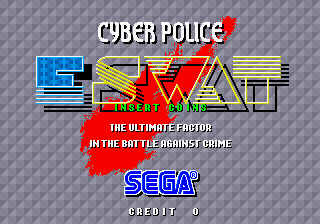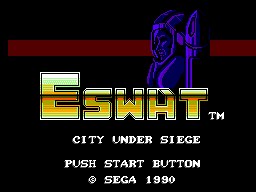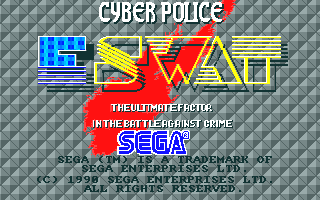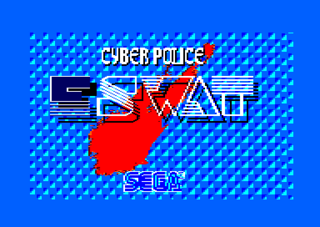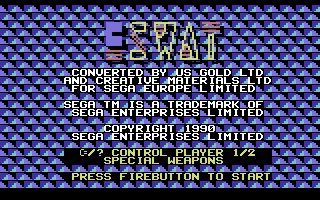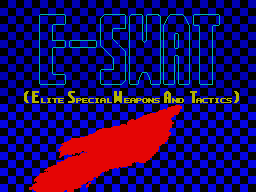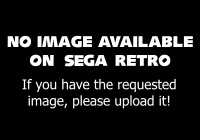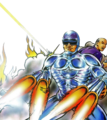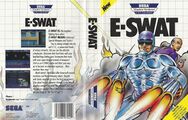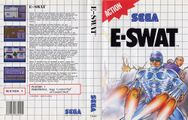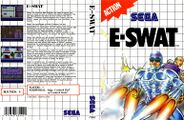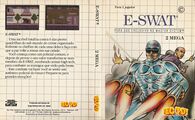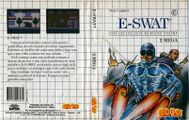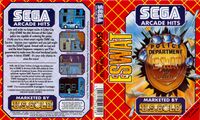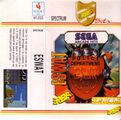Cyber Police ESWAT
From Sega Retro
- For the Sega Mega Drive release of Cyber Police ESWAT, see ESWAT: City Under Siege.
| ||||||||||||||||||||||||||||||||||||||||||||||||||||||||||||||||||||||||||||||||||||||||||||||||||||||||||||||||
| Cyber Police ESWAT | ||||||||||||||||||||||||||||||||||||||||||||||||||||||||||||||||||||||||||||||||||||||||||||||||||||||||||||||||
|---|---|---|---|---|---|---|---|---|---|---|---|---|---|---|---|---|---|---|---|---|---|---|---|---|---|---|---|---|---|---|---|---|---|---|---|---|---|---|---|---|---|---|---|---|---|---|---|---|---|---|---|---|---|---|---|---|---|---|---|---|---|---|---|---|---|---|---|---|---|---|---|---|---|---|---|---|---|---|---|---|---|---|---|---|---|---|---|---|---|---|---|---|---|---|---|---|---|---|---|---|---|---|---|---|---|---|---|---|---|---|---|---|
| System(s): Sega System 16, Sega Master System, Amiga, Amstrad CPC, Atari ST, Commodore 64, ZX Spectrum | ||||||||||||||||||||||||||||||||||||||||||||||||||||||||||||||||||||||||||||||||||||||||||||||||||||||||||||||||
| Publisher: Sega Enterprises, Ltd. U.S. Gold (UK) Erbe Software (ES) Tec Toy (Brazil) | ||||||||||||||||||||||||||||||||||||||||||||||||||||||||||||||||||||||||||||||||||||||||||||||||||||||||||||||||
| Developer: Sega R&D 1[1] Sanritsu Creative Materials | ||||||||||||||||||||||||||||||||||||||||||||||||||||||||||||||||||||||||||||||||||||||||||||||||||||||||||||||||
| Supporting companies: Sega R&D 2 (production) | ||||||||||||||||||||||||||||||||||||||||||||||||||||||||||||||||||||||||||||||||||||||||||||||||||||||||||||||||
| Distributor: Tec Toy (BR) | ||||||||||||||||||||||||||||||||||||||||||||||||||||||||||||||||||||||||||||||||||||||||||||||||||||||||||||||||
| Genre: Action[2] | ||||||||||||||||||||||||||||||||||||||||||||||||||||||||||||||||||||||||||||||||||||||||||||||||||||||||||||||||
| Number of players: 1 | ||||||||||||||||||||||||||||||||||||||||||||||||||||||||||||||||||||||||||||||||||||||||||||||||||||||||||||||||
|
Cyber Police ESWAT (サイバーポリス イースワット) is a side-scrolling shooter game developed by Sega R&D 1 for the Sega System 16 arcade board in 1989.
Contents
Story
Cyber Police ESWAT sees the player as Duke Oda, a Japanese-American police officer accepted into the crime-ridden Liberty City Police Department's top unit, E.S.W.A.T. (Enhanced Special Weapons and Tactics). Duke starts off as a regular human being, but during the course of the game is given a powered exoskeleton (called I.C.E. in the attract sequence, which stands for "Individual Combat Equipment") to fight against a powerful high-tech crime organisation named "E.Y.E." which is threatening the city. His ultimate goal is to apprehend "Balzar" a mad scientist, when E.Y.E is revealed to be a rogue artificial intelligence computer.
Gameplay
ESWAT is a run-and-gun game in which the player must eliminate threats approaching from either side of the screen. After completing a few missions, player is accepted to the elite E.S.W.A.T. unit and given a power suit and special weapons. Each stage is divided to several levels, and a boss is waiting at the end of each stage.
Power-Ups
- Bullets: Increase the number of bullets player has.
- Plasma Cannon: Powerful energy weapon that penetrates through enemies in a straight line.
- Multi-Shot: Opens fire to all targets in front of the player in a 90 degrees angle.
- Heat Charges: Launches two powerful bombs that travel around the screen. Strongest weapon in the game.
Stages (Arcade Version)
| Stage 1: Bank Robbery | |
|---|---|
| Boss: Fatman. He covers himself with a shield to block pistol shots. He will be vulnerable when he lowers his shield to breath a fire ball. Also occasionally rolls on the ground. | |
| Stage 2: Hostage Situation | |
| Boss: Nasty Nick. He uses the hostage as a shield and throws a hard to evade boomerang. Jump up and fire towards his face to damage him. Shooting the hostage does not penalize the player other than giving an ear-piercing shriek. Kicking him will knock Nick down instantly. | |
| Stage 3: Truck Stop | |
| Boss: The Captain. He will swing his anchor towards you like a flail. He can either swing while standing or crouching. He is vulnerable when he throws the anchor towards you. Completing this level will allow player to joing ESWAT unit and wear the power suit. | |
| Stage 4: Rooftops | |
| Boss: Dirty Duffy. He will attack you with his own power armor. Keep the distance from him and fire your arm mounted gatling gun away. He will occasionally jump over you to the other side of the screen. | |
| Stage 5: Derelict Building | |
| Boss: Flamethrower Guy. You will be attacked by multiple enemies and a guy with a flamethrower. He can rapidly reduce your health so, keep distance and fire away. | |
| Stage 6: Condemned Block | |
| Boss: Collapsing Building. Once you enter, Duffy will remotely activate explosives while the building you are in will slowly start to collapse. Stay clear from explosives as they detonate. Once you are out, Duffy will shoot his pistol towards you. A single shot will be enough to make him surrender. | |
| Stage 7: China Town | |
| Boss: Tiger. A tiger will charge towards you. Watch its movements carefully and jump when it is charging and duck when it is jumping over you. | |
| Stage 8: Warehouse | |
| Boss: Gorilla. It will either throw wooden barrels or get close and smash you with its fists. As usual, keep distance and fire away. If it is moving towards you, quickly move forwards and backwards to prevent it from cornering you. | |
| Stage 9: Rooftops | |
| Boss: Monster Truck. Rats Lee will be driving his oversized pick-up. His thugs at the back will throw grenades towards you. If the truck moves all the way backwards, move to the other edge of the screen as he will try to run over you. | |
| Stage 10: Dockyard | |
| Boss: Laser Turrets. A group of laser turrets will move upwards and downwards and fire their lasers. There is a considerable delay between firings so use this momentum to move around and avoid fire. | |
| Stage 11: Harbor | |
| Boss: Personal Flight Platforms. Two men with hovering bikes will fly around and attack you with lasers. They are quite fast so time your shots carefully and always move around to avoid projectiles. | |
| Stage 12: Factory | |
| Boss: Black Devils. Two robots equipped with the same ICE armor player is wearing will attack at the same time. They can jump around and crouch, making them much harder targets than usual. | |
| Stage 13: Secret Entrance | |
| Boss: Incinerator. A moving platform will drop molten iron lumps to the conveyor player is standing. Keep moving right to not to fall to the pitfall on the left and jump over the burning trash. Fire upwards whenever platform is nearby. | |
| Stage 14: Armory | |
| Boss: Mini-Tank. Rockets can be evaded by crouching while gun at the top will only hit you if you jump. Mortar at the back will be a problem however and you must watch avoid it by staying close to the tank or jumping backwards or forwards when it is just about to hit the ground. | |
| Stage 15: Balzar's Throne Room | |
| Balzar's throne will be surrounded by four tesla-coil like weapons. Keep moving around and fire towards each coil until they are destroyed. Heat Charges can bring them down very quickly if you have them. |
History
Legacy
Cyber Police ESWAT's moderate success saw it ported to multiple platforms. Sega brought it to the Sega Master System in 1990, and U.S. Gold were given the license to publish versions for home computers, including the Amiga, Amstrad CPC, Atari ST, Commodore 64 and ZX Spectrum.
A "sequel" or "remake" in the form of ESWAT: City Under Siege was released for the Sega Mega Drive in 1990. Cyber Police ESWAT and ESWAT: City Under Siege are frequently mistaken to be the same game, but although both share a similar gameplay style, the Mega Drive game is very different.
Production credits
- Main article: Cyber Police ESWAT/Production credits.
Magazine articles
- Main article: Cyber Police ESWAT/Magazine articles.
Promotional material
- Main article: Cyber Police ESWAT/Promotional material.
Artwork
Physical scans
System 16 version
| ExpandSega Retro Average |
|---|
| 67 | |
|---|---|
| Based on 2 reviews | |
Master System version
| ExpandSega Retro Average |
|---|
| 61 | |
|---|---|
| Based on 20 reviews | |
| Master System, BX† |
|---|
Mega-Tech version
| Mega-Tech, |
|---|
|
Amiga version
| ExpandSega Retro Average |
|---|
| 61 | |
|---|---|
| Based on 6 reviews | |
| Amiga, ES |
|---|
|
Amstrad CPC version
| ExpandSega Retro Average |
|---|
| 66 | |
|---|---|
| Based on 3 reviews | |
| Amstrad CPC, UK (disk) |
|---|
|
| Amstrad CPC, ES (Especial 8 Bits) |
|---|
|
Atari ST version
| ExpandSega Retro Average |
|---|
| 56 | |
|---|---|
| Based on 5 reviews | |
| Atari ST, ES |
|---|
|
Commodore 64 version
| ExpandSega Retro Average |
|---|
| 66 | |
|---|---|
| Based on 6 reviews | |
| Commodore 64, UK (disk) |
|---|
|
| Commodore 64, ES |
|---|
|
ZX Spectrum version
| ExpandSega Retro Average |
|---|
| 68 | |
|---|---|
| Based on 1 review | |
Technical information
ROM dump status
| System | Hash | Size | Build Date | Source | Comments | |||
|---|---|---|---|---|---|---|---|---|
| ? | 256kB | Cartridge (EU/US) | ||||||
| ? | 256kB | Cartridge (EU/US) | (Alt) | |||||
| ? | 256kB | EPROM cartridge | Page | |||||
| ? | 256kB | EPROM cartridge | Page | |||||
| ? | 256kB | EPROM cartridge | Page |
References
- ↑ @tsurumy on Twitter (Wayback Machine: 2020-09-04 15:45)
- ↑ File:ESWAT SMS EU Box.jpg
- ↑ Sega Arcade History, Enterbrain, page 101
- ↑ https://archive.org/details/ArcadeGameList1971-2005/page/n132/mode/1up
- ↑ Jump up to: 5.0 5.1 Electronic Gaming Monthly, "August 1990" (US; 1990-xx-xx), page 22
- ↑ Jump up to: 6.0 6.1 Mean Machines, "November 1990" (UK; 1990-10-29), page 83
- ↑ Jump up to: 7.0 7.1 Raze, "February 1991" (UK; 1990-12-20), page 36
- ↑ Sega Power, "December 1990" (UK; 1990-11-01), page 2
- ↑ Jump up to: 9.0 9.1 9.2 9.3 9.4 9.5 Computer & Video Games, "October 1990" (UK; 1990-09-16), page 125
- ↑ Jump up to: 10.0 10.1 10.2 10.3 Raze, "March 1991" (UK; 1991-01-31), page 32
- ↑ Jump up to: 11.0 11.1 Computer & Video Games, "January 1991" (UK; 1990-12-15), page 17
- ↑ Jump up to: 12.0 12.1 Amstrad Action, "March 1991" (UK; 1991-02-21), page 60
- ↑ Commodore User, "December 1989" (UK; 1989-11-26), page 129
- ↑ Computer & Video Games, "November 1989" (UK; 1989-10-16), page 97
- ↑ Hobby Consolas, "Marzo 1992" (ES; 1992-0x-xx), page 40
- ↑ Aktueller Software Markt, "November 1990" (DE; 1990-10-26), page 132
- ↑ Buzz! Computers (UK) (+0:00)
- ↑ Complete Guide to Consoles, "Volume III" (UK; 1990-08-xx), page 70
- ↑ Complete Guide to Consoles, "Volume IV" (UK; 1990-11-xx), page 95
- ↑ The Complete Guide to Sega, "" (UK; 1991-05-xx), page 55
- ↑ Console XS, "June/July 1992" (UK; 1992-04-23), page 140
- ↑ Computer & Video Games, "January 1991" (UK; 1990-12-15), page 116
- ↑ Mean Machines: The Essential Sega Guide, "" (UK; 1993-11-18), page 134
- ↑ Mega Play, "November/December 1990" (US; 1990-xx-xx), page 31
- ↑ Mean Machines, "November 1990" (UK; 1990-10-29), page 82
- ↑ Mean Machines Sega, "October 1992" (UK; 1992-09-xx), page 133
- ↑ Player One, "Décembre 1990" (FR; 1990-xx-xx), page 57
- ↑ Power Play, "1/91" (DE; 1990-12-14), page 180
- ↑ Sega Power, "December 1990" (UK; 1990-11-01), page 24
- ↑ Sega Power, "October 1991" (UK; 1991-09-05), page 56
- ↑ Sega Pro, "December 1991" (UK; 1991-11-21), page 55
- ↑ Sega Pro, "April 1993" (UK; 1993-03-11), page 70
- ↑ Video Games, "1/91" (DE; 1991-03-27), page 76
- ↑ CU Amiga, "February 1991" (UK; 1991-01-xx), page 72
- ↑ Jump up to: 35.0 35.1 35.2 Computer & Video Games, "January 1991" (UK; 1990-12-15), page 20
- ↑ Jump up to: 36.0 36.1 36.2 Joystick, "Janvier 1991" (FR; 199x-xx-xx), page 172
- ↑ Jump up to: 37.0 37.1 Power Play, "3/91" (DE; 1991-02-15), page 120
- ↑ Jump up to: 38.0 38.1 Zzap!64, "February 1991" (UK; 1991-xx-xx), page 84
- ↑ Computer & Video Games, "February 1991" (UK; 1991-01-16), page 62
- ↑ ST Action, "February 1991" (UK; 1991-01-xx), page 34
- ↑ ST Format, "February 1991" (UK; 1991-01-10), page 99
- ↑ C-Lehti, "1/91" (FI; 1991-12-14), page 54
- ↑ Your Commodore, "February 1991" (UK; 1991-01-25), page 36
- ↑ Zzap!, "Marzo 1991" (IT; 1991-xx-xx), page 58
- ↑ Your Sinclair, "March 1991" (UK; 1991-02-07), page 68
| CollapseCyber Police ESWAT | |
|---|---|
|
Main page | Comparisons | Maps | Credits | Hidden content | Magazine articles | Video coverage | Reception | Promotional material | |
- 1 player games
- All arcade games
- System 16 games
- 1989 System 16 games
- All 1989 games
- Mega-Tech games
- Unknown year games
- Arcade action games
- All action games
- US Master System games
- All US games
- EU Master System games
- All EU games
- BX Master System games
- All BX games
- UK Master System games
- All UK games
- AU Master System games
- All AU games
- BR Master System games
- All BR games
- Master System games
- 1990 Master System games
- All 1990 games
- Master System action games
- ES Amiga games
- All ES games
- UK Amiga games
- Amiga games
- 1990 Amiga games
- ES Atari ST games
- UK Atari ST games
- Atari ST games
- 1990 Atari ST games
- ES Amstrad CPC games
- UK Amstrad CPC games
- Amstrad CPC games
- 1990 Amstrad CPC games
- ES Commodore 64 games
- UK Commodore 64 games
- Commodore 64 games
- 1990 Commodore 64 games
- ES ZX Spectrum games
- UK ZX Spectrum games
- ZX Spectrum games
- 1990 ZX Spectrum games
- All games
- Old-style rating (hobbyconsolas)
- Update ratings template
- 1 old ratings
- Games with known prototypes
- Old technical information
- Cyber Police ESWAT
